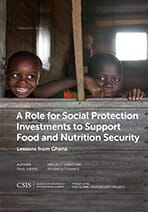News > Blog
A Role for Social Protection Investments to Support Food and Nutrition Security: Lessons from Ghana
Published 02/12/2018 by Global Communities

A Role for Social Protection Investments to Support Food and Nutrition Security: Lessons from Ghana
By Reid Hamel, Center for Strategic and International Studies (CSIS)
Executive Summary
Social safety net programs have expanded rapidly in recent decades as an instrument to combat extreme poverty and food and nutrition insecurity. In 2008, Ghana launched its Livelihoods Empowerment Against Poverty (LEAP) cash transfer program to provide basic support for households with orphaned children. Since that time, LEAP has grown to become the country’s flagship social protection program, reaching beneficiaries with varied vulnerability profiles nationwide. LEAP has also linked enrolled households to free healthcare through the National Health Insurance Scheme since 2012.
Ghana was a U.S. government Feed the Future focus country in the initiative’s first round (2010– 2017) and has been selected as a recipient of continued support. Feed the Future aims to reduce the prevalence of extreme poverty and stunting, primarily by investing in the growth and diversification of the agricultural economy. In Ghana, Feed the Future’s strategy also prioritized building the resilience of the least well off, those who lack the asset base to immediately benefit from commercial agricultural linkages.
In 2014, the U.S. Agency for International Development (USAID) committed $12 million to fund the pilot expansion of LEAP to include a new category of beneficiaries: pregnant women and children under one year old who live in extreme poverty. Reaching this group during a critical period of cognitive and physical development has the potential to drive reductions in stunting while priming the next generation for better health, social, and economic outcomes.
Read the full report here.





